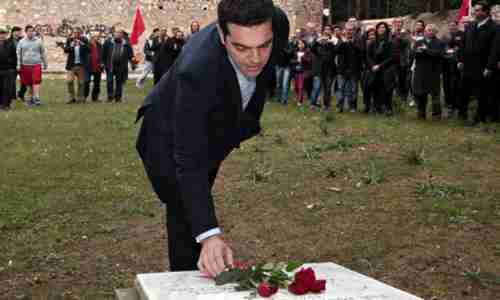This morning’s key headlines from GenerationalDynamics.com
- Greece’s Alexis Tsipras escalates confrontation with Germany
- Israel promises revenge after Hezbollah attack kills two soldiers
- Hezbollah’s attack breaks a taboo from 2006 war
Greece’s Alexis Tsipras escalates confrontation with Germany

Alexis Tsipras places flowers on the National Resistance Memorial in Kaisariani on Monday. (EPA)
On his first days on the job, Greece’s new Prime Minister Alexis Tsipras moved quickly to implement costly government programs that Brussels and Germany have warned him against. Wednesday’s announcements included halting the sale of the state-owned Public Power Corporation of Greece (PPC), halting the privatization of the port of Piraeus, raising pensions for those on low incomes, and reinstating some fired public service workers.
The Athens Stock Market index plunged 4%, with bank stocks falling over 12%. The Greek 10-year bond yield was at an unsustainable 10.3%, meaning that Greece would have to pay 10.3% interest to anyone willing to lend it money.
As if that weren’t enough, Tsipras delivered what one commentator called “another ‘up yours’ to the Germans”: He visited the National Resistance Memorial at Kaisariani where, on May 1, 1944, German Nazi forces executed 200 Greek citizens, mostly Communists.
In a recent article ( “26-Jan-15 World View — Alexis Tsipras’ far-left Syriza party wins historic election in Greece”), I asked whether Greece’s new far left prime minister Alexis Tsipras would be pragmatic, seeking an agreement with Brussels and Germany, or delusional, believing that he can bully the Europeans into accepting huge new spending programs by Greece’s government. After Tsipras’ first days on the job, it appears that he’s heading in the direction of being delusional. Kathimerini and Guardian (London)
Israel promises revenge after Hezbollah attack kills two soldiers
In the worst Hezbollah attack on Israel since the two were at war in 2006, Hezbollah fired anti-tank missiles at a convoy of Israeli military vehicles in Shebaa Farms in Israeli-occupied southern Lebanon. The attack killed two soldiers and injured several others. Israel responded by firing at least 25 artillery shells into Lebanon. Apparently, one of these artillery shells killed a Spanish member of the UN peacekeeping force that’s supposed to separate Hezbollah from Israeli forces.
According to a statement from Hezbollah:
At 11:25 [Wednesday morning] the Qunaitra Martyrs unit targeted with appropriate missile weapons an Israeli military convoy comprising several vehicles and [transporting] Zionist officers and soldiers causing the destruction of several vehicles and inflicting many casualties on the enemy.
Hezbollah made it clear that the attack was made in revenge for a January 18 Israeli airstrike at a convoy in Syria that killed two of Hezbollah’s top commanders, as well as five Iranians and a senior officer in Iran’s élite Islamic Revolution Guards Corps (IRGC). However, it’s feared that Hezbollah will demand additional revenge beyond the killing of two Israeli soldiers.
Israel’s prime minister Benjamin Netanyahu said that “Those behind the attack today will pay the full price,” and compared the situation to the run-up to summer’s Gaza war:
To anyone who tries to challenge us on the northern border, I suggest that they look at what happened here, at the Gaza Strip. Last summer Hamas took the hardest blow ever since its establishment and the IDF is ready to act, with might, in all sectors. Security is above all.
Ron Prosor, Israel’s ambassador to the UN Security Council, said that Hezbollah is violating the Security Council resolution that was passed following the 2006 war, which demands the disarmament of all armed groups in Lebanon:
For years, Hezbollah has been stockpiling weapons in Southern Lebanon in violation of Security Council resolution 1701. Hezbollah chief Hassan Nasrallah regularly threatens Israel and his terrorist organization took responsibility for this morning’s attack. Hezbollah has the military capabilities, it has made its intentions clear, and this morning we saw the results.
Israel will not stand by as Hezbollah targets Israelis. Israel will not accept any attacks on its territory and it will exercise its right to self-defense and take all necessary measures to protect its population.
Hezbollah and Israel have been building up to a new war ever since the 2006 war ended. The fear is that, with the heated rhetoric and tit-for-tat violence, the time will be now. Daily Star (Beirut) and Telegraph (London) and Algemeiner (New York)
Hezbollah’s attack breaks a taboo from 2006 war
In 2006, Hezbollah abducted two Israeli soldiers patrolling near the Lebanon border. Within four hours, Israel panicked and launched a full-scale war with Hezbollah, with no plan and no objectives. The war was a disaster for both Israel and Lebanon. Israel accomplished nothing but to destroy a great deal of Lebanon’s infrastructure.
Some people in Lebanon favored Israel to win the 2006 war, and some favored Hezbollah. But once the war ended, all the people of Lebanon were united in not wanting anything like that to happen again. And so it became taboo for Hezbollah to provoke Israel again and risk another attack. Wednesday’s attack breaks that taboo, and is the worst Hezbollah attack since the 2006 war.
The taboo was clearly stated in a Wednesday editorial in Beirut’s Daily Star:
Hezbollah’s reaction to Israel’s targeting of its convoy in Syria less than two weeks ago came as no big surprise Wednesday, as the resistance party was being pushed – both politically and physically – by Israel into a response. But it is imperative now that Hezbollah thinks of what is best for all of Lebanon, not just the party itself.
The party has made it clear that the attack in the Israeli-occupied Shebaa Farms came in retaliation for Israel’s deadly attack on its convoy. And Iran – which also lost a general in the attack – sent a warning to Israel Tuesday. But in terms of Syria’s place within all this, amid the numerous attacks against it by Israel over the last few years – the latest one occurring early Wednesday morning – it still seems it is unable or unwilling to retaliate itself.
Israel cannot claim to have been shocked by Hezbollah’s response, which it surely expected. Prime Minister Benjamin Netanyahu and many close to him in government will indeed have welcomed Hezbollah’s response, for parliamentary elections in March are fast approaching, and war is always good for a hawkish leader’s ratings.
This is just one of the many reasons that Hezbollah must now act with wisdom, caution and also a degree of humbleness. It would do Israel too many favors now to escalate the situation on the border.
Hezbollah must think of the entire country, and not just its own interests and pride. Lebanon cannot afford the response that Israel is promising. The country is in such a precarious security position that a new conflict could prove disastrous.
The concern is that now that the taboo is broken, the floodgates are open. (Sorry for the mixed metaphor.) Hezbollah’s leaders may feel that they have not extracted enough revenge for Israel’s January 18 attack, and Israeli leaders have already promised retaliation for Wednesday’s attack. Even if neither side wishes a war, a war may occur anyway through miscalculation, as each side retaliates for the other side’s previous retaliation. That’s pretty much how last summer’s Gaza war began, and it could happen again. Daily Star (Beirut)
KEYS: Generational Dynamics, Greece, Alexis Tsipras, Syriza, Brussels, Germany, National Resistance Memorial at Kaisariani, Israel, Hezbollah, Shebaa, Lebanon, Benjamin Netanyahu, Ron Prosor, Sayyed Hassan Nasrallah
Permanent web link to this article
Receive daily World View columns by e-mail

COMMENTS
Please let us know if you're having issues with commenting.